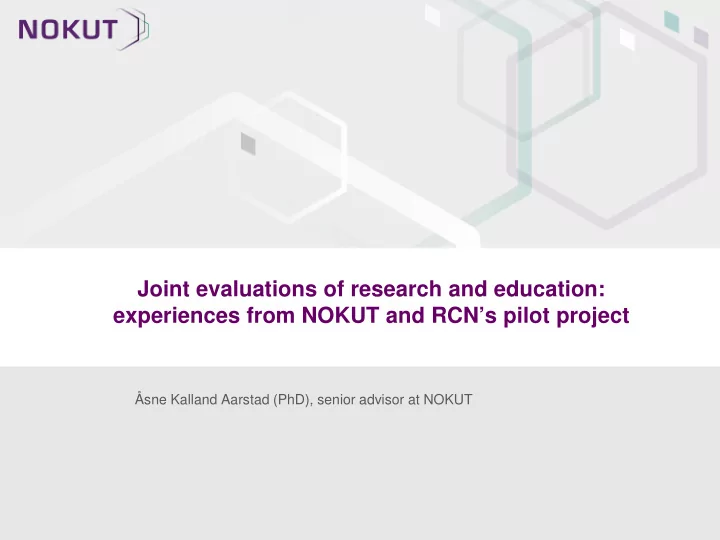

Joint evaluations of research and education: experiences from NOKUT and RCN’s pilot project Åsne Kalland Aarstad (PhD), senior advisor at NOKUT
Presentation structure Evaluation model and progress 1. Results from the education evaluation 2. Results from the interplay evaluation 3. Reflections on future evaluations of research and 4. education in Norwegian higher education 26.06.2018 | 2
Mandate • In 2014 NOKUT and the Research Council of Norway (RCN) were commissioned by the Norwegian Ministry of Education and Research to develop and test a model for joint evaluations of education and research. • The model should also enable evaluations of the interplay between research and education 12.06.2018 | 3
Evaluation model • Three sets of evaluations • Separate expert panels for research and education • Joint expert panels for interplay 12.06.2018 | 4
Interplay evaluation Econ Pol.sci Soc Panel Panel Panel Research evaluation (NFR) econ pol.sci soc Panel Panel Panel Panel econ pol.sci soc other Educational evaluation (NOKUT)
NOKUT The receives self- institutions evaluation receive self- from Selection of Expert panels evaluation Project outline in participating quality dimensions receive data form cooperation with institutions sources and in cooperation the Research assessment with reference Council of Norway tools. group NOKUT compiles data packages on the quality dimensions for participating institutions Draft sub- Final sub- 1 st meeting reports/ reports: conclusions: Final Draft Interplay Political interplay interplay Political 3 rd meeting meetings Science report report Science Sociology Sociology 2 nd meeting Economics Economics 12.06.2018 | 6
Education quality indicators Initial competence 1. Programme design 2. Teaching and learning methods 3. Learning environment in study programmes 4. Educational competence 5. Achieved learning 6. Internationalisation 7. Relevance 8. Educational leadership 9. 26.06.2018 | 7
Results: educational quality 26.06.2018 | 8
Results: educational quality • Conclusion reached across the three panels: o Overall picture: good o Large variations between institutions o Lacking international orientation o Methods training: too little, too late 26.06.2018 | 9
Results: educational quality • Conclusion reached across the three panels: o Traditional teaching – and assessment methods o Cumulative structure necessary o Faculty size: challenging for smaller institutions 26.06.2018 | 10
Results: educational quality • Conclusions deriving from the different disciplines: o Political science: name/content o Sociology: autonomy re. admission requirements o Economics: mathematics specialization and leave behind integrated master programmes 26.06.2018 | 11
The interplay evaluation 26.06.2018 | 12
Why interplay? • Why #1: Increasing curiosity about how research quality can be said to influence educational quality • Why #2: Trend towards large-scale evaluations of multiple activities/dimensions 26.06.2018 | 13
What exactly did the panels evaluate? Step 1 Step 2 Step 3 Step 4 Comment on the Comparison of Assessment of relationship between research quality interplay Highlight patterns research quality, and educational dimensions for across institutions educational quality, quality for each each within the discipline. and level of interplay institution. institution. at each institution. 26.06.2018 | 14
Interplay indicators Organizational conditions 1. Academic staff R&D orientation 2. Research-based curriculum 3. Use of student active learning forms 4. Variation of teaching and learning methods 5. Involvement in staff research 6. Assessment practice 7. 12.06.2018 | 15
Results: interplay • Not surprising: the institutions that perform well in the research evaluation also performs well in the education evaluation, and vice-versa. No evidence of zero-sum game… • According to all panels: decisive that the education is provided by an active research environment, and that lecturers have research experience – or ideally – are active researchers themselves. 26.06.2018 | 16
Results: interplay • Larger institutions have the resources to provide research-based education across the spectre of courses and specialization offered. Smaller institutions should take measures to ensure research-based education: specialize and/or collaborate. • The panels strongly recommends that the research orientation of the bachelor-level is strengthened. More methods, more application of methods, and larger bachelor theses/projects. Important not only for the quality of education, but also for increasing the labour market relevance of the bachelor degree. 26.06.2018 | 17
The road ahead… • NOKUT can not evaluate, audit or accredit study programmes without a thorough assessment of the research environments in which the programmes are based • By merging research evaluations with educational evaluations, we can achieve a range of additional benefits: Institutions get a more comprehensive picture of the • quality of their core activities within the same time frame If executed correctly: institutions would experience • fewer and instead more comprehensive evaluations 26.06.2018 | 18
The road ahead… • However: the future joint evaluations would need to be joint from the very beginning: joint panels, mandate, and steering group • Future joint evaluations in research and education would have to concentrate on these two core activities for the sake of feasibility 26.06.2018 | 19
• The research, education and interplay reports will be launched on Tuesday 19 th of June in Oslo • All reports will be available online at nokut.no and at forskningsradet.no THANK YOU! 26.06.2018 | 20
Recommend
More recommend